 of my eighth grade classes. The camping trip is a type of rite of passage for the students, as every school here in Taiwan takes their second graders (they call 'eighth graders' 'second graders', because they start over counting when the student enters junior high) away for a three-day camping trip at some point during the fall term. In trying
of my eighth grade classes. The camping trip is a type of rite of passage for the students, as every school here in Taiwan takes their second graders (they call 'eighth graders' 'second graders', because they start over counting when the student enters junior high) away for a three-day camping trip at some point during the fall term. In trying  to describe this camping trip, think military boot camp meets cheerleader camp. It is impossible for me to give a full depiction of what this experience looked like, so I will attempt to give my scattered reflections backed-up with video. Camping was quite the experience for me because (a) I was with 750 thirteen and fourteen year-olds, (b) military boot camp for teenagers is just a crazy cultural experience period, and (c) they were 750 *Taiwanese* teenagers, and I was staying with all of the Taiwanese teachers, so the entire week was Chinese overload - picture a very confused Grace. But it was still so much fun! :)
to describe this camping trip, think military boot camp meets cheerleader camp. It is impossible for me to give a full depiction of what this experience looked like, so I will attempt to give my scattered reflections backed-up with video. Camping was quite the experience for me because (a) I was with 750 thirteen and fourteen year-olds, (b) military boot camp for teenagers is just a crazy cultural experience period, and (c) they were 750 *Taiwanese* teenagers, and I was staying with all of the Taiwanese teachers, so the entire week was Chinese overload - picture a very confused Grace. But it was still so much fun! :)Video 1: 左右 Chant
We left by bus early Wednesday morning. They needed 19 buses to take up all 19 classes, so we had quite a caravan going on along the highway.
 I rode up with Ellie and her homeroom class. Once we arrived at the retreat center, we turned the students over to the travel agency. Schools not only rent out a retreat center for the camping site, but they also hire a "travel agency" which is in charge of the kids for the three days. The "travel agents" (what the other teachers kept calling them,
I rode up with Ellie and her homeroom class. Once we arrived at the retreat center, we turned the students over to the travel agency. Schools not only rent out a retreat center for the camping site, but they also hire a "travel agency" which is in charge of the kids for the three days. The "travel agents" (what the other teachers kept calling them,  though
though  I found it an odd translation for their job description) are basically like drill sergeants, in charge of yelling at the students and whipping them into shape. The teachers were very excited prior to the trip, for they claimed that the students would all be much better behaved when they returned to school the following week. While the students slept in purple tents and had to cook their own food at regimented times, the teachers were put up in a lovely hotel and fed every five minutes (Asians eat more often than any other culture I have been in; it is a mystery how they remain so slim and petite!).
I found it an odd translation for their job description) are basically like drill sergeants, in charge of yelling at the students and whipping them into shape. The teachers were very excited prior to the trip, for they claimed that the students would all be much better behaved when they returned to school the following week. While the students slept in purple tents and had to cook their own food at regimented times, the teachers were put up in a lovely hotel and fed every five minutes (Asians eat more often than any other culture I have been in; it is a mystery how they remain so slim and petite!).  The teachers had a very relaxing week, free of any responsibilities towards their students. While the students were shuffled off to do team building exercises, the teachers were were given a tour of
The teachers had a very relaxing week, free of any responsibilities towards their students. While the students were shuffled off to do team building exercises, the teachers were were given a tour of 
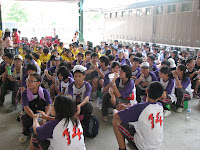 the retreat grounds which included a toy train ride, a boat ride and lots more of food. The retreat center was gorgeous. It included a large lake, a lotus pond, scenic mountains with meandering foot paths, lots of flowers and landscaping and even a monkey island. They took us
the retreat grounds which included a toy train ride, a boat ride and lots more of food. The retreat center was gorgeous. It included a large lake, a lotus pond, scenic mountains with meandering foot paths, lots of flowers and landscaping and even a monkey island. They took us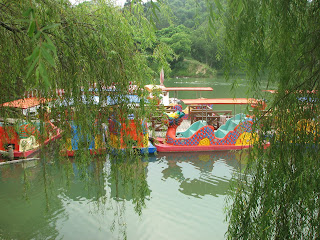 out on a "hua fang," which is an ancient Chinese-style boat, but they also had many dragon boats and swan boats. My observation of these boats was that they were paddle boats, though the sign definitely labeled them as "bicycle boats." Love the Chinglish.
out on a "hua fang," which is an ancient Chinese-style boat, but they also had many dragon boats and swan boats. My observation of these boats was that they were paddle boats, though the sign definitely labeled them as "bicycle boats." Love the Chinglish.The majority of my time I spent with the other teachers. In the process, I came to the realization that they are quite terrified of me. At school, most of them will say "hi" and
 smile at me in the hallways, but once we arrived at the retreat center, I noticed that the majority of them were studiously avoiding me. Even the other English teachers seemed to be making efforts to not stand next to me or not to sit next to me. This concerned me the first day, and I was worried that I had somehow done something to make them all secretly hate me. Since I was mostly following around Ellie, my co-teacher, I then became worried that perhaps she felt like she had to babysit me and that I was a burden. As everything going on around me was in Chinese, I never really knew what was going on. Ellie would translate for me sometimes, but not always, so I felt quite lost the majority of the time (yes, my Chinese is improving here, but it is nowhere near the level needed to completely follow an average conversation). This did not concern me so much, though, as my fear that the other teachers did not want me around them.
smile at me in the hallways, but once we arrived at the retreat center, I noticed that the majority of them were studiously avoiding me. Even the other English teachers seemed to be making efforts to not stand next to me or not to sit next to me. This concerned me the first day, and I was worried that I had somehow done something to make them all secretly hate me. Since I was mostly following around Ellie, my co-teacher, I then became worried that perhaps she felt like she had to babysit me and that I was a burden. As everything going on around me was in Chinese, I never really knew what was going on. Ellie would translate for me sometimes, but not always, so I felt quite lost the majority of the time (yes, my Chinese is improving here, but it is nowhere near the level needed to completely follow an average conversation). This did not concern me so much, though, as my fear that the other teachers did not want me around them.However, it turns out that I just make them very nervous. All of them, including the English teachers, were terrified of having to speak English to me. Apparently, being excited to have me at their school is quite different from having to actually talk to me and have a conversation. Never before have I thought of myself as an "intimidating" person. Since they as teachers drill grammar rules into their students and are unforgiving of any mistakes, they were extremely afraid of talking to me and making English errors. By the end of the first day, however, a few of them began making efforts to overcome their fear and to approach me.
 The funniest thing to me was that the director of student affairs, whose cubicle desk is right next to mine in our office, suddenly began speaking to me in fluent English. For the past month, I have thought that he did not know any English. Whenever I would want to talk to him,
The funniest thing to me was that the director of student affairs, whose cubicle desk is right next to mine in our office, suddenly began speaking to me in fluent English. For the past month, I have thought that he did not know any English. Whenever I would want to talk to him, 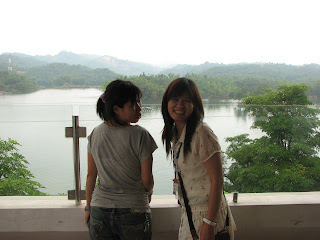 I would try to use my broken Chinese or else have the guy across from me (Su - a biology teacher with a great sense of humor) translate. And here, all of a sudden, I discover Pei Xing speaks English - probably better English even than Su! Then he began dragging other teachers over to talk to me and became incredibly solicitous about trying to help me with things. Yube, one of the other English teachers, later told me that he was frantically questioning all of the English teachers and trying to learn more English words before every time he talked with me. Her explanation for his lack of English back at Minghua was that he knew that I could always communicate with several of the other directors in English, notably Tsuili. Tsuili and the others were not on the camping trip, so now he felt pressure to try to communicate himself. Seeing how nervous they are to use their practically fluent English makes me so embarassed by the state of my Chinese... Especially since I am living in their country, yet they are having to translate things back into English for me.
I would try to use my broken Chinese or else have the guy across from me (Su - a biology teacher with a great sense of humor) translate. And here, all of a sudden, I discover Pei Xing speaks English - probably better English even than Su! Then he began dragging other teachers over to talk to me and became incredibly solicitous about trying to help me with things. Yube, one of the other English teachers, later told me that he was frantically questioning all of the English teachers and trying to learn more English words before every time he talked with me. Her explanation for his lack of English back at Minghua was that he knew that I could always communicate with several of the other directors in English, notably Tsuili. Tsuili and the others were not on the camping trip, so now he felt pressure to try to communicate himself. Seeing how nervous they are to use their practically fluent English makes me so embarassed by the state of my Chinese... Especially since I am living in their country, yet they are having to translate things back into English for me.As the other teachers became marginally more relaxed around me throughout the week, I felt more comfortable hanging out with them. Another thing I found amusing was how the teachers would drag over other teachers to try to talk to me (my students do this all the time). The line is always, "Oh Grace/Teacher, so-and-so really wants to talk to you, but (s)he is so nervous," and then they push the poor individual forward. On one of the evenings, I was with a group of teachers who wanted to introduce me to one guy who enjoyed following politics and economics. They knew that had been my major in school, so had decided to try to discuss Taiwanese politics for my benefit. These types of conversations, 80% Chinese and 20% English, while incredibly amusing, will be so much more interesting once I begin understanding Chinese better. If nothing else, I am hoping that this week will have made them slightly less nervous to be around me in the future and will have shown them that they can have fun with me in either Chinese and English.
For meal times, I mentioned how the kids had to make
 their
their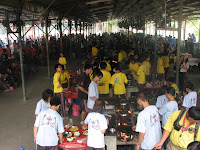 own food. This is a first for many of them, because in Taiwan, parents do not teach their kids to cook. In fact, my experience so far has been that most individuals under the age of 35 do not know how to cook. Eating out is very inexpe
own food. This is a first for many of them, because in Taiwan, parents do not teach their kids to cook. In fact, my experience so far has been that most individuals under the age of 35 do not know how to cook. Eating out is very inexpe nsive here, so most people opt for take-out or else they are still living at home with their parents who cook for them.
nsive here, so most people opt for take-out or else they are still living at home with their parents who cook for them. 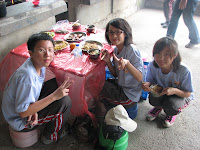
 Taiwanese culture expects unmarried children (particularly girls, but sometimes even guys) to live at home with their family (I love my parents dearly, but I certainly cannot ever imagine still living with them when I am, say, 32!). At first, I thought that the younger generations did not know how to cook simply because they lived at home where their parents still took care of them.
Taiwanese culture expects unmarried children (particularly girls, but sometimes even guys) to live at home with their family (I love my parents dearly, but I certainly cannot ever imagine still living with them when I am, say, 32!). At first, I thought that the younger generations did not know how to cook simply because they lived at home where their parents still took care of them. 
 However, even my friends who live on their own do not know how to cook. This week, the other teachers explained to me that parents solely expect their children to study. In the US, students strive to be well-rounded in every area and to fill up their resumes with unique extracurriculars. This is not the case in Taiwan. Here the parents expect their children to dedicate all of their time to schoolwork, neglecting even to train them in how to cook and clean.
However, even my friends who live on their own do not know how to cook. This week, the other teachers explained to me that parents solely expect their children to study. In the US, students strive to be well-rounded in every area and to fill up their resumes with unique extracurriculars. This is not the case in Taiwan. Here the parents expect their children to dedicate all of their time to schoolwork, neglecting even to train them in how to cook and clean. 
 Therefore, forcing the students to cook for themselves for three days straight is very momentous for the kids. During meal-times, we would walk down to observe the students cooking, and it was fairly amusing to see their efforts. Most of them complained that the food was too salty, and then would offer to let me taste it. I was too smart for that. :)
Therefore, forcing the students to cook for themselves for three days straight is very momentous for the kids. During meal-times, we would walk down to observe the students cooking, and it was fairly amusing to see their efforts. Most of them complained that the food was too salty, and then would offer to let me taste it. I was too smart for that. :)Probably the most interesting part of the week was Thursday evening when
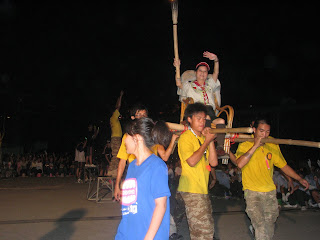 they had a large bonfire. All of the students had spent the last month practicing class dances and songs to perform on this evening. However, before their performances started, they brought out a Sedan chair and paraded the principal around the un-lit bonfire.
they had a large bonfire. All of the students had spent the last month practicing class dances and songs to perform on this evening. However, before their performances started, they brought out a Sedan chair and paraded the principal around the un-lit bonfire.  Then the principal ceremonially lit the fire, and the initiated blaze was accompanied by a fireworks display. At this point, all of the students were screaming, jumping up and down and doing all of their chants. They
Then the principal ceremonially lit the fire, and the initiated blaze was accompanied by a fireworks display. At this point, all of the students were screaming, jumping up and down and doing all of their chants. They  pulled the teachers out to the middle of the circle, having us form a ring around the bonfire. We were expected to join in with the students' dance, with instructions being shouted at us from the loud speaker. I had no idea
pulled the teachers out to the middle of the circle, having us form a ring around the bonfire. We were expected to join in with the students' dance, with instructions being shouted at us from the loud speaker. I had no idea 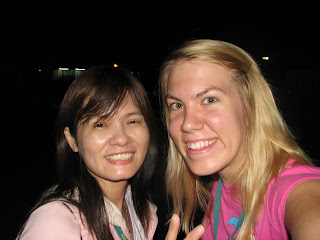 what was going on. My goal was just to spin, clap my hands and run around the circle without bumping into too many other people. The best part was when they suddenly froze the music and shouted out new
what was going on. My goal was just to spin, clap my hands and run around the circle without bumping into too many other people. The best part was when they suddenly froze the music and shouted out new  instructions. Suddenly, I had people running at me from everyone tapping me on the head. Then the music started again and I had to dance again. The music stopped, new instructions, and now people were chucking me on the chin. Next we were foot-bumping, and then giving hugs. The last one cracked me up because they had us hip-bumping. I had students running up to me going "Teacher!" and then freezing, because they weren't sure if they should hip-bump me or not. Priceless. Actually, a great analogy of how I felt would be like the Caucus Race from "Alice in Wonderland" - everyone running in all directions simultaneously while singing and screaming at the top of their lungs, while I am trying to avoid being trampled and to not look too much like an idiot.
instructions. Suddenly, I had people running at me from everyone tapping me on the head. Then the music started again and I had to dance again. The music stopped, new instructions, and now people were chucking me on the chin. Next we were foot-bumping, and then giving hugs. The last one cracked me up because they had us hip-bumping. I had students running up to me going "Teacher!" and then freezing, because they weren't sure if they should hip-bump me or not. Priceless. Actually, a great analogy of how I felt would be like the Caucus Race from "Alice in Wonderland" - everyone running in all directions simultaneously while singing and screaming at the top of their lungs, while I am trying to avoid being trampled and to not look too much like an idiot.After this diverting experience, all of the performances began. I really do not know how to explain these, but luckily, I took lots of videos which will hopefully help. Over half of the classes incorporated Super Junior's "Sorry Sorry" song in some fashion (Super Junior is all the rage here in Taiwan - from first graders to adults, but especially my junior highers - think Backstreet Boys go Korean...). If you would like to see the original, check out: http://www.youtube.com/watch?v=x6QA3m58DQw&feature=fvst.
Video 2: More Chanting
Video 3: "Sorry Sorry Sorry - Naked Naked Naked"
Video 4: Super Junior Meets Michael Jackson
Conversation I had with a student two weeks ago about Michael Jackson:
Student: Your President is Obama
(Me thinking: Clever child.)
Me speaking: Why yes, he is.
Student: He's black.
(Me thinking: Oh my goodness - why is that the first thing Taiwanese people always say?!)
Me speaking: Why yes, he is. Do you have any black friends? (me knowing perfectly well she does not, because no Taiwanese do)
Student: Michael Jackson is black too! Now he's dead.
(Me thinking: Yes child, yes, he is.)
Video 5: More Dancing, just because


























